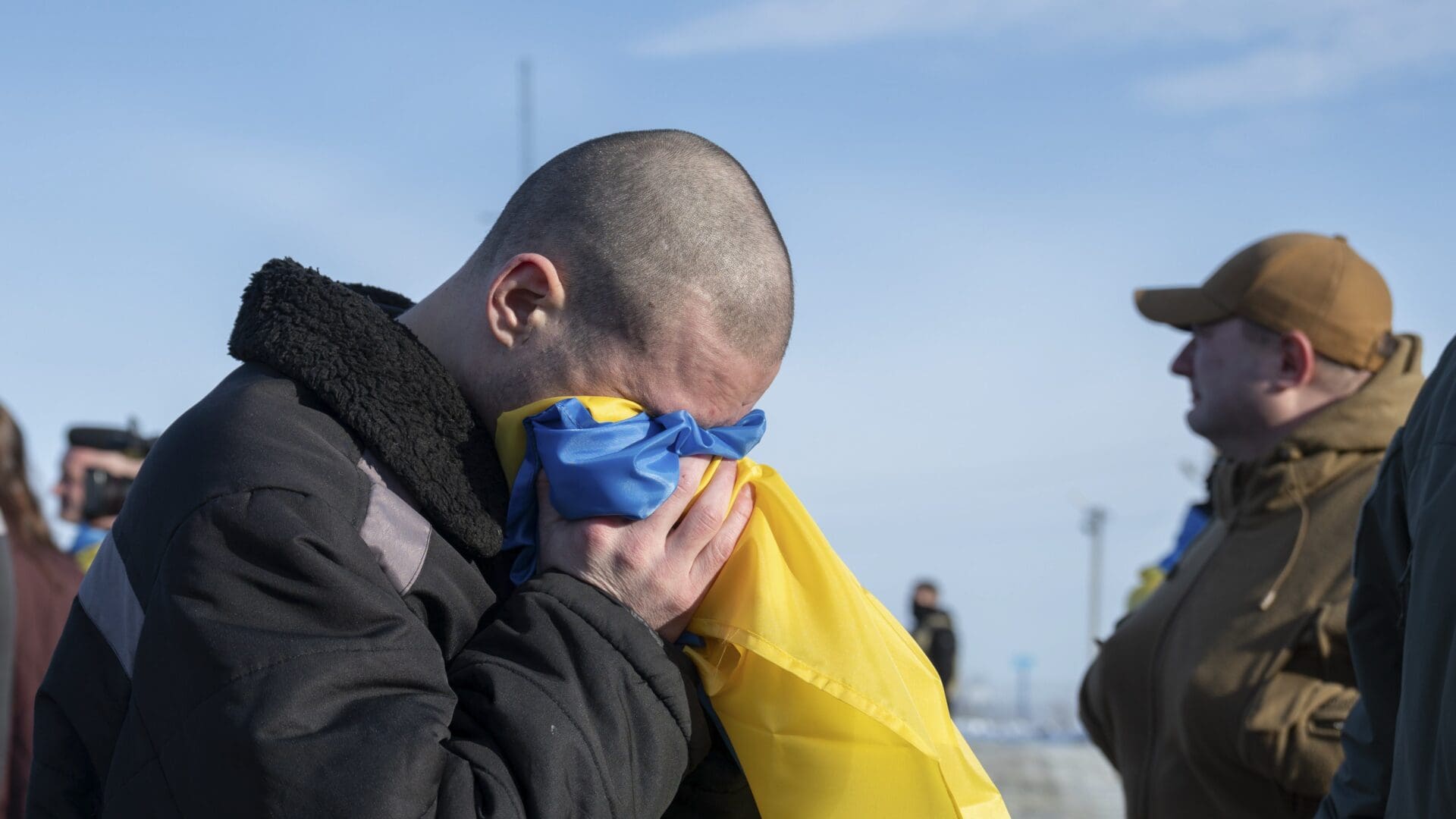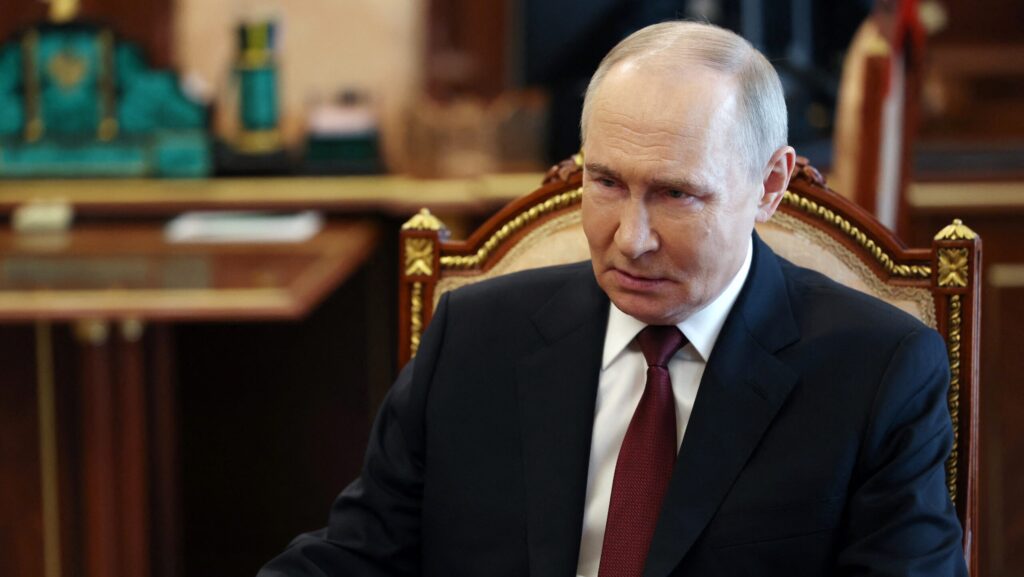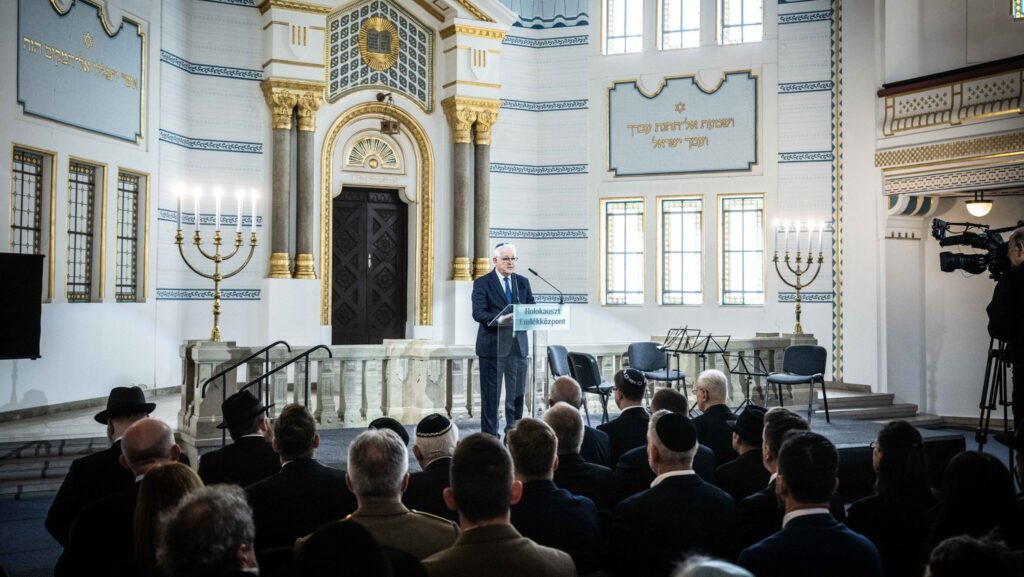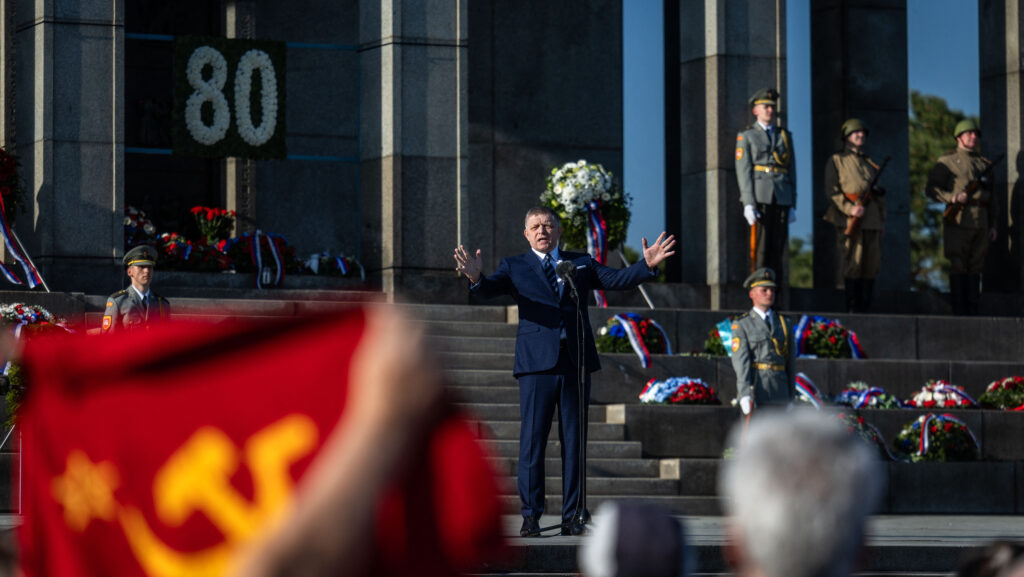Everything in the world today is taking place under the shadow of the terrible news from the Middle East but I think this makes the discussion that we’re going to have about the war between Russia and Ukraine all the more important. As different as Hamas and the Putin regime may seem they’re actually two variants of the same phenomenon.
The slaughter of innocent civilians in Israel is comparable in many respects to what has taken place in the occupied areas of Ukraine.
The world is becoming increasingly dangerous and the need to define our values and identify what we are willing to fight for is more pressing than ever. It will soon be two years since the beginning of full-scale war between Russia and Ukraine. The war is often justified by the Russians on the grounds that Ukraine is not a country, but this is persuasive for people who have little knowledge of Russian history. In fact, if Ukraine is not a country, then the Russia Federation is not a country either because they were created at the same time. Both the Russian Soviet Federal Republic and the Ukrainian Soviet Republic were created in 1923 when the Soviet Union was constituted.
The Bolsheviks were concerned to dismantle the Tsarist Empire, which definitely no longer exists. The way to do this, as the Bolsheviks well understood, was to split it up along national lines. They never intended, however, for the newly independent national republics to slip out of Russian control. They therefore defined each national republic as an independent state, (including the Russian republic) and presented the Soviet Union as a collection of voluntarily united independent countries.
The consequences of this were sometimes comical. After the end of World War II, Stalin said he the Soviet Union deserved 15 seats at the United Nations for each of the Soviet republics and it took a lot of bargaining to get him to accept only three seats, for the Russian Republic the Ukrainian Republic and the Belarussian Republic.
After the Soviet Union was created, there was an efflorescence of national culture in each of the former national republics. In Ukraine, the Ukrainian language and culture which had been suppressed was suddenly encouraged. There were Ukrainian newspapers and theatrical productions. There was instruction in Ukrainian schools and universities in the Ukrainian language. All of this was not only tolerated but actively encouraged. The catch was that the republics which were supposedly developing their national cultures could only do so within the framework of communist ideology. In other words, you were free to read Marx and Lenin in Ukrainian, in Belorussian, in Armenian, in Georgian or any other of the Soviet Union/s languages but you weren’t free to read anything that contradicted Marxism-Leninism.
In 1985, when Gorbachev came to power and decided that the Soviet Union needed access to free information in order to overcome economic stagnation, he created a situation in which, for the first time, people were able to appreciate their national cultures outside of the framework of Marxist–Leninist ideology. As a result, a conflict was opened between the reigning ideology on the one hand and truthful information on the other and, as the internal crisis in the Soviet Union mounted, it became clear that either the world of truth would destroy the world of lies or the organized lying would destroy the world of truth.
This situation was very difficult for the retrograde elements in the Soviet Union to control. The sphere of truthfulness expanded exponentially. Gorbachev was in a position where in order to suppress the new world that was coming into being he would have had to discredit himself and so he repeatedly sided with the reformers with the result that the ideology became progressively discredited.
The effect of exposure to truthful information was stunning. Every national culture had been depicted as striving toward its full realization in the creation of a socialist state. But people now learned about the Ukrainian famine in which three million people were deliberately starved to death to create the collective farm system. They learned about the Molotov–Ribbentrop-Pact and the secret protocols that made it possible for the Soviet Union to take over the Baltic republics.
As millions realized that their national culture had nothing to do with the socialist state, the force of rekindled nationalism became overpowering. In the end, the Soviet Union split along national lines and all 15 of the constituent republics including Ukraine voted for independence. In Ukraine, the vote was 90 per cent in favor of independence and those voting in favor included the citizens of the Russian speaking regions Russia was later to invade including Crimea where there was a large retired Russian military presence.
After the Soviet Union broke up along the lines of the republics that formed it, the various successor states entered into treaties with each other. There have been roughly 250 treaties including a treaty of friendship and cooperation signed in 1997 between Russia and Ukraine all of which recognize Ukraine in its existing boundaries including Crimea. At a joint press conference held by Putin and Leonid Kravchuk, the president of Ukraine, in 2002, Putin said that he had no objections to Ukraine joining NATO. He said that Ukraine is an independent country it had as much a right to join NATO as any other country. He made similar statements until 2013 when the Euromaidan Revolt broke out in Ukraine and self-organizing demonstrations against kleptocratic rule in Ukraine succeeded in overthrowing the regime and replacing it with a with a leadership that was pro-western. It was only then that all previous statements were ignored, and Russia began a massive propaganda campaign about supposed Nazis in Ukraine, a claim that was then used to justify its aggression.
Why, despite this history, did Russia take it upon itself to attack a country which in no way threatened it and with which many Russians have family and personal ties? The answer lies in what happened after the fall of communism.
It is important to remember that a communist regime is based on class values. Communists reject the idea of transcendent morality embodied in the Judeo–Christian tradition. Morality for communists is determined by the interests of the historically most progressive social class, in their view the working class whose thinking is done for it by the communist party. The result of imposing this point of view was the destruction of all morality. This is what happened in the Soviet Union.
As a result, when the Soviet Union fell, it was essential to replace the Soviet moral framework, in particular, by establishing the rule of law which is at bottom an expression of universal values because the equality of individuals before the law mirrors the equality of the believer before God.
Unfortunately, the Communist ideological inheritance was carried over into the new period.
What became essential for those known as the ‘young reformers’ was to transform the economic system regardless of whether there was a framework of legality in which that transformation could take place. The result was the criminal takeover of the country. Property was distributed on the basis of corrupt ties and those who acquired that property instead of developing it, stripped the assets, plunging the country into an economic crisis that was almost unprecedented. National income fell by 50 per cent. That didn’t happen even under Nazi occupation. The male death rate in Russia reached a level seen only in African countries in the throes of civil war. It had never been seen in an industrial country in peacetime.
Demographers have a measure which they call surplus deaths. This is the number of deaths over the number that could have been expected on the basis of the projection of existing trends. In Russia, during the 1990s, that number was six million so it was clear that Yeltsin who was the president during this period had no hope of reelection even if a way could have been found to skirt the constitutional bar to serving more than two consecutive terms. The public opinion polls showed that his approval rating was two per cent. In this situation, he chose an unknown head of the Federal Security Service (FSB), Vladimir Putin, as his successor.
Putin was almost totally unknown and his approval rating, probably because of his association with Yeltsin, was two per cent. But Yeltsin was sure that Putin would become the next president. He told Bill Clinton that Putin would be the next president in a telephone call on September 8.
On August 30, a building was blown up in Buinaksk, a city in Dagestan. On September 9 and 13 apartment buildings were blown up in Moscow. On September 16, a building was blown up in Volgodonsk. As a result of the bombings, the country was panicked into a second war against the breakaway region of Chechnya and Putin was suddenly on television constantly vowing to wreak vengeance on the cruel terrorists who had murdered ordinary Russians as they slept. On this basis, he was elected president.
Despite the strangeness of these events, the mystery surrounding the apartment bombings would probably never have been penetrated were it not for the fact that a fifth bomb was found in a building in Ryazan and quickly deactivated. A massive search began, and the would-be bombers were arrested. They turned out not to be Chechen terrorists but agents of the FSB. The bomb was identical to those that had been used in the previous four successful bombings. The evidence was overwhelming and incontrovertible that the successful bombings had also been carried out by the FSB and that Putin came to power through an act of terror against his own people. In reality, all signs suggest that he has lived in fear of his own people ever since.
The failure to speak out publicly on the bombings, in my view, was the greatest mistake of American foreign policy in the last 30 years. Secretary of State Madeline Albright declined to answer a direct question from Jesse Helms, the chairman of the U.S. Senate Foreign Relations Committee as to who was responsible for the bombings. Her answer was that the U.S. is opposed to terrorist acts in all their forms, a non-answer that helped to bury the truth about the bombings for many years.
In the case of the 1999 bombings, the Russian leaders used a supposed attack on the population to distract people from the leaders’ own crimes and direct it toward a foreign enemy. The same technique was used in the case of the Russian Ukrainian War. The seizure of Crimea in 2014 gave a boost to Putin’s popularity. A person who once had a popularity rating of 2 per cent, after the annexation of Crimea, had a popularity rating of nearly 90 per cent. But the effect began to wear off and as the contradictions in the Russian system became more and more serious and the United States demonstrated by abandoning its ally in Afghanistan that it did not have the will to defend its allies or its principles the stage was set for the present war.
Now we know that Putin was expecting an easy victory. This is typical for Russia. The Russians always expects an easy victory. They expected an easy victory in Chechnya. They expected an easy victory in the Russo–Japanese war. They expected an easy victory in the Russo–Finnish War. They even underestimated Hitler and the Wehrmacht. So,
there’s nothing unusual about them plunging into war unprepared and throwing untrained troops into a mass slaughter.
I’ve been in touch with people in Russia. I can tell you that in some cases the amount of time that elapses between the moment a Russian gets what’s called a summons to report for military service and the time he comes back in a zinc coffin is sometimes less than 5 weeks.
In the meantime, the Russian authorities are showering those who fight in Ukraine with money and there are very generous with death payments. The money and the deafening propaganda has stifled discontent. It’s a terrible testimony to what is going on in Russia that people are often more concerned about the money they get for a husband or son killed in the war than they are for the relative himself. There was a program on Russian television that could only appear in Russia showing a mother and father who have received a payment for the death of their son explaining that they’re going to buy a car with the money and the first thing they’re going to do with the car is drive to the cemetery to visit his grave.
Initially, there was a great deal of support in the West for Ukraine because of the obvious aggression to which it has been subjected but increasingly people are asking if support for Ukraine is worth the money that’s being spent and whether the time has come to end the conflict and ‘save lives.’ But this type of reasoning is dishonorable and dishonest. Every war ends with a ceasefire and an agreement of some sort, either a ceasefire or an agreement or both. The question is whether a ceasefire that left Russia with 20 per cent of Ukrainian territory and rewarded their aggression would result in peace. I’m sorry to say it would not.
The Putin regime set out completely to subjugate Ukraine and its objectives have not changed. At the same time, Ukraine, having suffered so grievously, is not willing to give up its sovereign territory and allow those under occupation to be subjected to the same kind of barbarity that was displayed by Hamas in Israel. Anything but the defeat of Russia will immediately be followed by partisan warfare and a renewal of the hostilities by Russia at the first opportunity.
In the case of the first Chechen War, the Russian signed a peace treaty in 1997 in which they promised that further questions between Russia and the Chechen Republic would be settled by peaceful means. But these assurances meant nothing. The Russians blamed the Chechens for the bombing of the buildings which all evidence shows were committed by the FSB and used the bombings as an excuse to start a new war.
There has been a tremendous flood of disinformation about the cost of the war as if cost was an issue when people are dying in defense of our values. But the reality is that if support for Ukraine is not renewed and Ukraine, as a result is defeated the next step for Russia will be to threaten NATO. The Russians have no problem inventing pretexts. The Russian military doctrine pledges them to defend Russian speakers wherever they may be. There are plenty of Russian speakers in Estonia and Latvia. There may be Russian speakers to defend even here in Hungary.
War is always a test of will. A nation is not defeated until it admits defeat. The Ukrainians are unwilling to admit defeat. If at some point they decide they cannot go on because of the terrible casualties they’re taking, that’s a decision for them to make, not for the people who are supplying them with the arms that they need to defend themselves and their national integrity.
The leaders of criminal states watch the behavior of the United States.
In addition to the Baltics and Eastern Europe, there are many places where the resolve of the West can be tested, including the Middle East and Taiwan. The U.S. must show that it will defend its allies. The members of the NATO alliance must show that they will stand by the United States.
We don’t want a world run according to Russian or Chinese or Hamas or Iranian values. But unfortunately, we cannot be sure that these forces can be held at bay unless we’re willing to defend what we have.
The views expressed by our guest authors are theirs and do not necessarily represent the views of Hungarian Conservative.








